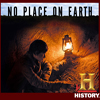Eyewitnesses to “No Place on Earth”: USC Shoah Foundation announces IWitness learning activity based on remarkable story of survival during the Holocaust

USC Shoah Foundation – the Institute for Visual History and Education (the Institute) announces a special education outreach effort to mark the theatrical release of the acclaimed documentary film No Place on Earth, a film directed by Janet Tobias, which chronicles the experiences of 38 men, women and children who survived the Holocaust in Ukraine by hiding in natural cave systems for 511 consecutive days, living underground longer than any human had ever done before.
 No Place on Earth makes its theatrical debut today in Los Angeles. Six of those who survived in the caves have given video testimony to the Institute for its Visual History Archive, and students and teachers can watch their testimonies in IWitness, the Institute’s award-winning educational website (iwitness.usc.edu). Their recollections are also the basis for an IWitness Information Quest activity, which the Institute launched in support of HISTORY® Classroom’s digital resource guide for the film that helps students learn about the survival strategies used by the 38 men, women and children, the unique physical and political adversities they faced, and the power of personal testimony in exploring the past. The IWitness activity is suitable for students in grades 6 through 10 and supports learning in social studies, history, ethics, European history, Holocaust and genocide studies, and earth sciences. Links to these resources are available online at www.noplaceonearthfilm.com
No Place on Earth makes its theatrical debut today in Los Angeles. Six of those who survived in the caves have given video testimony to the Institute for its Visual History Archive, and students and teachers can watch their testimonies in IWitness, the Institute’s award-winning educational website (iwitness.usc.edu). Their recollections are also the basis for an IWitness Information Quest activity, which the Institute launched in support of HISTORY® Classroom’s digital resource guide for the film that helps students learn about the survival strategies used by the 38 men, women and children, the unique physical and political adversities they faced, and the power of personal testimony in exploring the past. The IWitness activity is suitable for students in grades 6 through 10 and supports learning in social studies, history, ethics, European history, Holocaust and genocide studies, and earth sciences. Links to these resources are available online at www.noplaceonearthfilm.com
“We’re thrilled offer these educational resources and testimonies connected to No Place on Earth to give students the opportunity to learn from the experiences of men, women, and children who survived with all odds against them, and literally emerged from darkness with their humanity intact and with a message to guide and inspire future generations,” said Dr. Kori Street, Director of Education for the Institute.
Like this article? Get our e-newsletter.
Be the first to learn about new articles and personal stories like the one you've just read.